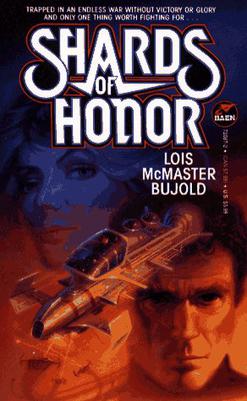
The Vorkosigan Saga is a series of science fiction novels and short stories set in a common fictional universe by American author Lois McMaster Bujold. The first of these was published in 1986 and the most recent in May 2018. Works in the series have received numerous awards and nominations, including five Hugo award wins including one for Best Series.
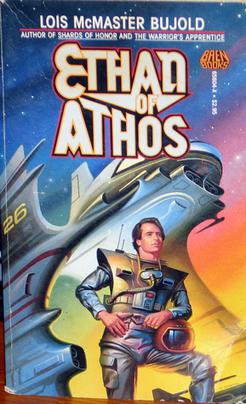
Ethan of Athos is a 1986 science fiction novel by American author Lois McMaster Bujold. The title character is Dr. Ethan Urquhart, Chief of Biology at the Sevarin District Reproduction Centre on the planet Athos, who is sent to find out what happened to a shipment of vital ovarian tissue cultures. Set in the fictional universe of Bujold's Vorkosigan Saga, the novel mentions but does not feature her usual protagonist Miles Vorkosigan. To date, Bujold has never revisited the settings of Athos or Kline Station in her many subsequent novels, but the events of Ethan of Athos are later referred to indirectly in the novels Borders of Infinity (1989) and Cetaganda (1995).
John Barnes is an American science fiction author.
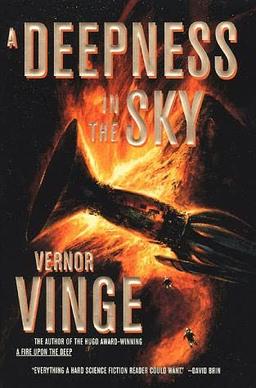
A Deepness in the Sky is a science fiction novel by American writer Vernor Vinge. Published in 1999, the novel is a loose prequel to his earlier novel A Fire Upon the Deep (1992). The title is coined by one of the story's main characters in a debate, in a reference to the hibernating habits of his species and to the vastness of space.
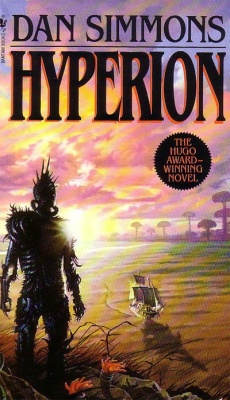
Hyperion is a 1989 science fiction novel by American author Dan Simmons. The first book of his Hyperion Cantos, it won the Hugo Award for best novel.

An extraterrestrial or alien is any extraterrestrial lifeform; a lifeform that did not originate on Earth. The word extraterrestrial means "outside Earth". The first published use of extraterrestrial as a noun occurred in 1956, during the Golden Age of Science Fiction.
The exploration of politics in science fiction is arguably older than the identification of the genre. One of the earliest works of modern science fiction, H. G. Wells’ The Time Machine, is an extrapolation of the class structure of the United Kingdom of his time, an extreme form of social Darwinism; during tens of thousands of years, human beings have evolved into two different species based on their social class.
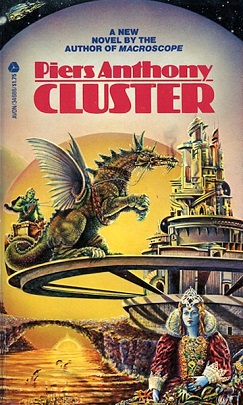
Cluster is a series of science fiction novels by Piers Anthony. Anthony originally conceived of and wrote the series as a trilogy but later added two additional volumes.

Orbital Resonance is a science fiction novel by John Barnes. It is the first of four books comprising the Century Next Door series, followed by Kaleidoscope Century, Candle, and The Sky So Big and Black.
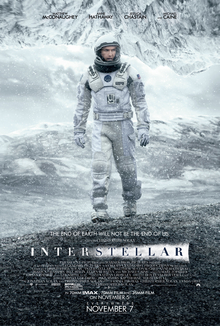
Interstellar is a 2014 epic science fiction film co-written, directed, and produced by Christopher Nolan. It stars Matthew McConaughey, Anne Hathaway, Jessica Chastain, Bill Irwin, Ellen Burstyn, Matt Damon, and Michael Caine. Set in a dystopian future where humanity is struggling to survive, the film follows a group of astronauts who travel through a wormhole near Saturn in search of a new home for mankind.
The planetary systems of stars other than the Sun and the Solar System are a staple element in many works of the science fiction genre.
The Heinlein juveniles are the science fiction novels written by Robert A. Heinlein for Scribner's young-adult line. Each features "a young male protagonist entering the adult world of conflict, decisions, and responsibilities." Together they tell a loosely-connected story of space exploration. Scribner's published the first twelve between 1947 and 1958, but rejected the thirteenth, Starship Troopers. That one was instead published by Putnam. A fourteenth novel, Podkayne of Mars, is sometimes listed as a "Heinlein juvenile", although Heinlein himself did not consider it to be one.

Venus Plus X is a science fiction novel by American writer Theodore Sturgeon, published in 1960. David Pringle included it in his book Science Fiction: The 100 Best Novels.

Earth Made of Glass (1998) is a science fiction novel by American writer John Barnes, the second book of his Thousand Cultures series. The story is told from the perspective of a middle-aged special agent named Giraut. Earth Made of Glass examines religious extremism when two different cultures are forced into proximity.

The Merchants of Souls is a 2001 science fiction novel by John Barnes and the third book in the Thousand Cultures series.

The Armies of Memory (2006) is a science fiction novel by American writer John Barnes, the fourth book of his Thousand Cultures series. The story is told from the perspective of a middle-aged special agent named Giraut. The Armies of Memory explores the intermingling of artificial and human intelligence as an alien threat is on the horizon.
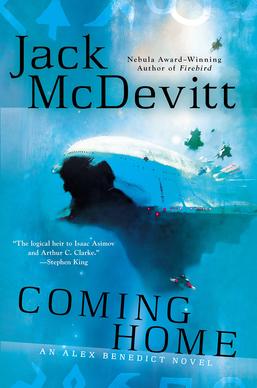
Coming Home is a science fiction novel by American writer Jack McDevitt. It is the seventh in the Alex Benedict series, and was released in November 2014. Coming Home was nominated for the 2014 Nebula award for best novel.
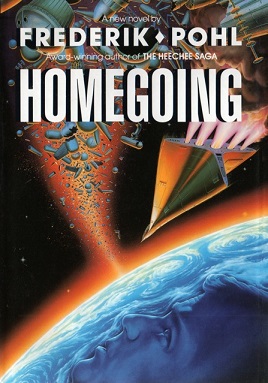
Homegoing is a science fiction novel by American author Frederik Pohl, first published in 1989 by Del Rey Books. The novel was one of the nominees for the Locus SF Award, one of the awards of the Hugo Awards.
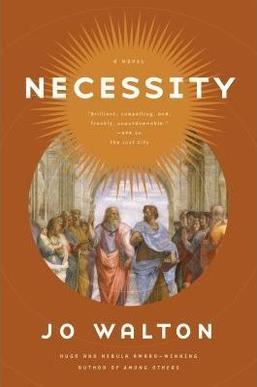
Necessity is a fantasy/science fiction novel by the Welsh–Canadian author Jo Walton, published by Tor Books in 2016. It is the conclusion of the Thessaly trilogy, and the sequel to The Just City and The Philosopher Kings, which were both published in 2015.

An Informal History of the Hugos is a 2018 reference work on science fiction and fantasy written by Jo Walton. In it, she asks if the nominees for the Hugo Award for Best Novel were indeed the best five books of the year, using as reference shortlists from other awards in the genre. After looking at the first 48 years of the award and presenting essays on select nominees, Walton concludes that the Hugo has a 69% success rate. The book was well-received and was itself nominated for a Hugo Award in 2019.
















